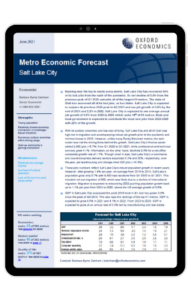US | Metro Economic Forecast: Salt Lake City

Ranking near the top in nearly every metric, Salt Lake City has recovered 94% of its lost jobs from the nadir of the pandemic. Its net decline of 0.4% from the previous peak of Q1 2020 outranks all of the largest 51 metros. The state of Utah has recovered all of its lost jobs, as has Idaho. Salt Lake City is expected to surpass its previous 2020 peak in Q2 2021 and see job growth of 3.8% by the end of 2021 and 2.2% in 2022. Salt Lake City is expected to see average annual job growth of 0.9% from 2023 to 2025 which ranks 14th of 51 metros. State and local government is expected to contribute the most new jobs from 2023-2025 with 22% of the growth.
What you will learn:
- With its outdoor amenities and low cost of living, Salt Lake City and all of Utah saw high net in-migration and accompanying robust job growth prior to the pandemic and minimal losses in 2020. However, unlike many Rocky Mountain metros, the tech sector was not the driving force behind the growth.
- These jobs numbers reflect Salt Lake City’s robust population growth in recent years. However, after growing 1.4% per year, on average from 2014 to 2019, Salt Lake’s population grew only 0.7% with 8,400 new residents from Q1 2020 to Q1 2021.
- GDP is expected to grow 8.5% in 2021 and 4.1% in 2022. From 2023 to 2025, GDP is expected to grow at an annual rate of 2.0% led by manufacturing and real estate.
Tags:
Related Services

Post
Food prices to bottom out in 2024, risks skewed to upside
Our baseline forecast is for world food commodity prices to register an annual decline this year, in aggregate, reducing pressure on food retail prices further downstream. However, we believe the risks to this forecast are overwhelmingly skewed to the upside.
Find Out More
Post
Battery raw material prices to recover
Battery raw materials prices bottomed out last quarter and we think a sustained recovery is looming. Midstream EV battery manufacturing activity has picked up again and inventories have returned to historical levels, suggesting upstream demand for raw materials will also bounce back.
Find Out More